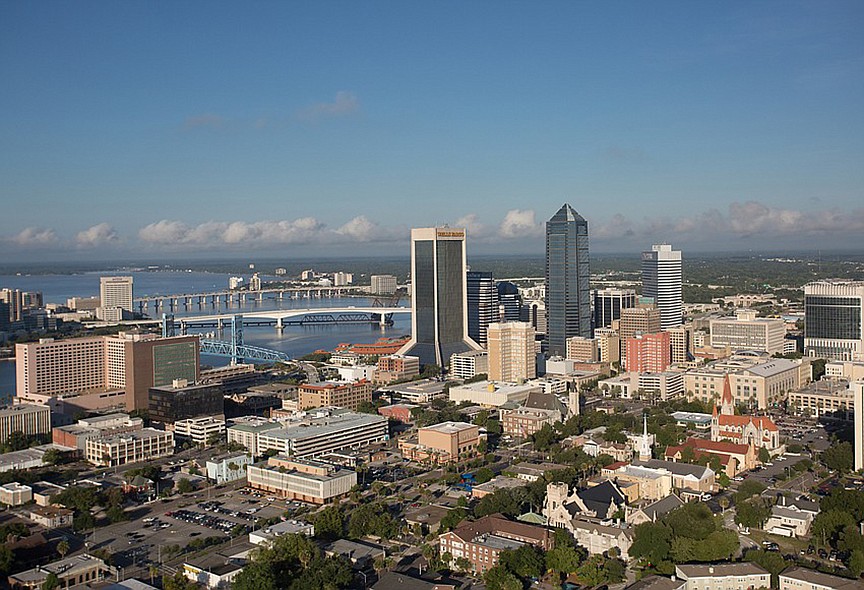
As Jacksonville City Council members prepare to take the final votes Sept. 26 on Mayor Donna Deegan’s $1.75 billion city general fund budget and $406 million Capital Improvement Plan, they will decide whether to commit $13.63 million of the city’s remaining $63.62 million federal COVID-19 assistance to fund recommendations from her transition committees that began meeting in July.
In total, Deegan’s budget would put $25 million toward the transition committees’ recommendations with $12 million also earmarked for the general fund.
In an email Sept. 18, Deegan’s Director of Communications Phil Perry said it has not been “officially determined” how the $25 million will be spent, including what will be invested in improving the city’s economic development strategies.
According to the administration, the mayor’s executive staff is working to complete the final committee reports and determine how to split that American Rescue Plan money among the committee focus areas: infrastructure; health; public safety; constituency and community outreach; military and veterans; arts, culture and entertainment; and economic development.
A draft version of the Economic Development Transition Committee’s final report provided Sept. 11 shows local business organization leaders, developers, small business owners and city economic development officials want, among other changes:
A faster permitting system to speed up projects; less redundancy in the city approval process; more education for small and emerging businesses about how to navigate city programs; and financial incentives that can adapt to changing economic conditions.
The economic development committee focused on five areas —small business ladders; Downtown development; permitting; talent development; and economic development projects.
A final version of the report is expected to be available by the end of September.

City Office of Economic Development Executive Director Ed Randolph, who chaired the six committee meetings from June 23-Aug. 21, said Sept. 19 via email that the experts who spoke to the committee on permitting had “overlapping observations and concerns.”
“Those included: lack of city staff available to process permits; the continual increase of time it takes to get a permit approved (some of which is deemed to be tied to the lack of staff); and the overall inability for permit applicants to meet with city staff in the beginning of the permit process, to help clarify/correct any of the documents being submitted for formal review,” Randolph wrote.
Downtown Development
For Downtown, Randolph said “higher interest rates are making it difficult for developers to move forward with projects without a greater share of public incentives, than usual; the development and maintenance of downtown infrastructure, including parks and other public spaces, is important to developers and business owners that are investing in downtown; and the myriad permitting and regulatory processes for programming, development and available incentives, needs to be simplified and better advertised.”
The 12 subject matter experts who provided testimony to the subcommittee July 21 agreed that pieces of the design vetting processes by the Downtown Development Review Board are redundant, specifically in historic preservation and signage.
Developers told the committee that the DIA’s incentive programs should be updated to reflect current market conditions that include higher interest rates for lending and the cost of materials.
The report says Recaptured Enhanced Value Grants, or property tax refunds, “are not enough for the type of catalytic projects they want to see that are going to bring real density, with ground floor activation and resilient construction types.”
Some developers want to see more cash completion grants from the city for larger projects. The report says developers in the current market could need assistance during the construction phase of the project.
Most city incentives are paid out after the project is completed, and developers will use bridge loans based on a project development agreement with the city to access more construction capital.
“Jacksonville is 20% more expensive than Orlando or Tampa because Jacksonville has limited local resources from a subcontractor base and (it’s) challenging to get the materials needed for the type of catalytic projects that we want to see off the ground,” the draft report says.
“All of those things going on behind the scenes cause (an) escalation in costs.”
The report suggests the city needs to fully fund Downtown riverfront parks but did not give a financial target.
These are the recommendations in the report for the city’s Downtown development processes:
• Create individual DIA applications based on application type with the ability to sign and submit the documents electronically.
• Amend the city code to permit staff approval of sign replacements previously approved by the DDRB if the replacement sign is similar in size, location or type.
• Authorize staff to unilaterally approve tenant signs that adhere to the Zoning Code.
• Identify public parks and roadway projects requiring DDRB approval at the conceptual level only.
• Amend the code to authorize staff level approval for all parking areas and sidewalk-only projects unless deviating from the Design Guidelines or Zoning Code.
• Eliminate the workshop requirement for select deviations for properties not fronting the St. Johns River, Hogans Creek or McCoys Creek; existing buildings, building entrance criteria for new construction; rooftop criteria for new construction.
• Modify the code to require one DDRB review for buildings with historic designation after issuance of Certificate of Appropriateness by the city Historic Preservation Section.
• Increase marketing of Downtown to Jacksonville residents through funding and capacity.
• Downtown is different: Rules, plans and standards should reflect Downtown’s unique character, dense environment, walkability and public transit options.
• We get the Downtown we support: Sufficiently funding the DIA and the Downtown Master Plan is essential, specifically infrastructure improvements today and future maintenance at future prices.
• Appearances matter: Improve the built environment, public realm and parks including landscaping throughout to make Downtown feel like the premier center it is for Northeast Florida.
• Raise the standards: Investments in built environment and police and ambassadors are essential to keep Downtown feeling “Clean & Safe” because “dirty & dangerous” does not work.
• Homelessness affects everyone: Getting people off the streets helps them and helps Downtown. Invest in rapid rehousing with wraparound services for vulnerable individuals as well as affordable housing.
• Invest in tourism: Attractions and amenities for visitors. Capitalize on the riverfront. Improve the quality of life for all residents.
• Invest in arts & culture: Downtown Jacksonville is “the nexus of arts & culture and must support & embrace the cultural community who is essential to creating identity and a sense of place.”
• Bolster efforts to attract visitors and residents to our Downtown as a premier destination with something for everyone — ”one-of-a-kind amenities, local businesses and the river.”
• Make events easier: Lower barriers to event permitting to invite and support smaller event producers, while also recruiting other national events to Downtown.
• Invest in place-making. Support community-driven place-making best practices that foster an engaged creative community, that will produce cool things that make our Downtown more vibrant.
• Increase marketing of Downtown to Jacksonville residents through funding and capacity.
• Replicate Tampa and St. Petersburg by creating a Riverwalk Specialty Center.
• Change policy to unlock activation and activities.
• Fully fund riverfront parks.
• Connect riverfront parks and public spaces.
• Enhance maintenance for landscaping and physical assets through funding and capacity.
• Incentivize transformational projects.
• Contract directly with design firms to keep the project moving. If a change is needed, it can be made immediately versus waiting six months on the city process.
• (Acknowledge the) importance of public/private partnerships.
• Vacant Downtown parcels are needed for the Hogans Creek project. The city does not have the capacity for land acquisition both from a human resource perspective and funding.
• It’s important that the city not sell, trade or give away any parcels near the creek until the design is more advanced.
• Every city department should understand the scope of the trade-off in the creek restoration projects.
• Evolve residential incentives based on market conditions.
• Historic preservation is a “tangible investment in the future of a place.”
• It is sometimes difficult to reach or calculate “with precision” the economic return on investment of historic preservation and it can be daunting to achieve a performance metric in calculating that ROI in the present moment.
• Emphasize public investment and public support for historic preservation.
• Sell city-owned land in the Cathedral District other than land needed for Groundwork Jacksonville.
• Use the sale proceeds from the land as grants for historic landmark church renovations or park improvements.
• Significantly increase code enforcement officers.
• Code enforcement should be complaint driven not code violation driven.
• Code enforcement needs to cite nuisance properties and not only properties that have complaints filed against them.
• Host historic church tours in the district that are more organized and formal.
• Focus on market-rate residential housing.
• There is a need to have healthy neighborhoods with a balance of mixed-income, supporting the retail and mixing that with affordable housing.
• Lighting is the “easiest most impactful change or fix that could be made.” Lighting illuminates the space and makes people feel safer.
• Landscaping: Setting Downtown apart from the rest of the city with unique plants, employing staff to ensure cleanliness, and maintaining the aesthetic appearance of the city.
• Safety: Change the perception that Downtown is not safe.
• Incentives for small businesses investing in 2,500 to 20,000 square feet of light industrial space in the urban core.
• Incentives for the industrial light business sector and other small businesses moving their business to Downtown.
• The Certificate of Use process is difficult and lengthy. It can take six to eight months to open a business.
• Infrastructure and Public Works. The area at the corner of Talleyrand and Gator Bowl Boulevard off of the Hart Bridge, which is the main entrance to the light industrial sector, floods within less than one hour of rain.
• There are enhancement programs that DIA puts out and enhancement programs that the city puts out, but they do not communicate.
• Being able to communicate with different city organizations.
• City Office of Economic Development Executive Director Ed Randolph: Committee chair and economic development projects subcommittee lead.
• JAX Chamber Chief Innovation Officer Carlton Robinson: Small business Ladders subcommittee lead.
• Jacksonville Cultural Council past CEO and entrepreneur Tony Allegretti: Downtown Development subcommittee lead.
• Downtown Vision Inc. CEO Jake Gordon: Downtown development subcommittee member.
• Haskell Director of Strategic Accounts Allan Iosue: Permitting subcommittee lead.
• JAXUSA Partnership Senior Vice President of Strategy and Talent Development Anna Lebesch: Talent development subcommittee lead.
• First Coast Hispanic Chamber of Commerce President Monica Hernandez.
• Jacksonville Black Chamber of Commerce President Shannon Denson.
• The Sistah Covenant Founder and CEO Pat Gillum Sams.
• EDC3 Broadline Distributor and Third Party Logistics Provider E. Shawn Ashley.
• Downtown business owner and retailer Larry Hazouri.
• Downtown Investment Authority CEO Lori Boyer.
• Downtown Vision Inc. CEO Jake Gordon.
• Groundwork Jacksonville CEO Kay Ehas.
• Executive Director Build Up Downtown Allan DeVault.
• Jacksonville Historical Society Executive Director Alan Bliss.
• Cathedral District Jacksonville President and CEO Ginny Myrick.
• 1904 Music Hall, Ocean St. Tacos, Spliffs Gastropub and Underbelly co-owner/operator Jason Hunicutt.
• MFG MERCH co-founder Jerry Rodriguez.
• Driver, McAfee, Hawthorne & Diebenow partner Attorney Cyndy Trimmer.
• Gateway Jax CEO Bryan Moll.
• The Southern Group lobbyist Jim Gilmore.
•City Chief of Development Services Ellyn Cavin.
•Planning and Development Department Chief of Building Inspection Josh Gideon.
•England Thims & Miller, Inc. CEO Hugh Matthews
•Hart Resources land acquisition, development and entitlement firm President Curtis Hart
•Driver, McAfee, Hawthorne & Diebenow Partner Attorney Steve Diebenow.
•District 11 City Council and Mambos Cuban Cafe owner member Raul Arias.
•Spinner Construction/Jax Green Industrial owner Bill Spinner.
•Cathedral District on Cathedral Hill Community Development Chair Tamara Baker.
•City Fire Inspection Division Fire Prevention Captain James Groff.
•Jacksonville Fire and Rescue District Chief Terrance Jones.